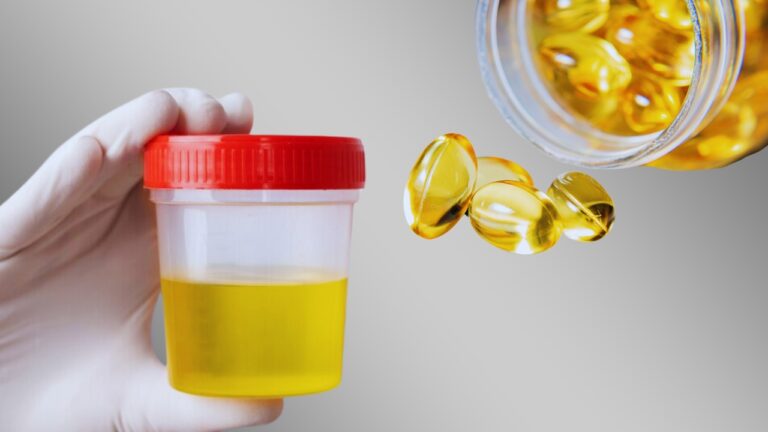If you’ve noticed a change in your urine color after taking vitamins, you might wonder what’s going on.
Yes, certain vitamins can indeed change the color of your urine.
For example, vitamin B2 (riboflavin) often turns urine a bright yellow, while large doses of vitamin C can make it light orange.
Another significant factor is the form in which you consume your vitamins.
Supplements tend to come in higher concentrations than foods, which is why you might see a more noticeable change.
Foods like beets or blackberries can also alter urine color, turning it pink or red, so don’t be alarmed if you notice this after a meal.
Normal Urine Color Spectrum
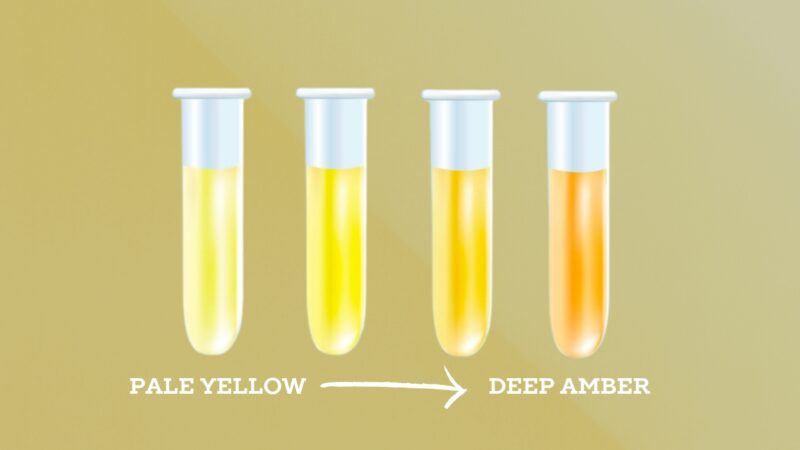
Urine typically ranges from pale yellow to deep amber. The color is primarily due to a pigment known as urochrome, which is produced when your body breaks down hemoglobin.
A pale yellow hue indicates proper hydration and balance of fluids. On the other hand, dark amber or honey-colored urine often suggests dehydration and the need for more liquids says Cleveland Clinic.
Healthy urine can occasionally be more transparent, especially if you’ve consumed large amounts of water. This range is considered normal and indicates that your body is effectively processing fluids and excreting waste.
Factors Influencing Urine Color
- Diet and Hydration: The amount of water you consume directly affects urine color. More water means lighter urine, while less water leads to darker shades. Foods like beets and berries can cause red or pink urine.
- Medications: Some medications and vitamins can alter urine color. For example, vitamin B2 (riboflavin) often turns urine a bright yellow.
- Medical Conditions: Health issues such as liver or kidney disorders can result in darker urine. Blood in the urine, manifesting as pink or red, can be caused by conditions like kidney stones or urinary tract infections.
- Exercise: Intense physical activity can cause temporary changes, including red or reddish urine due to muscle breakdown.
Vitamins and Their Impact on Urine
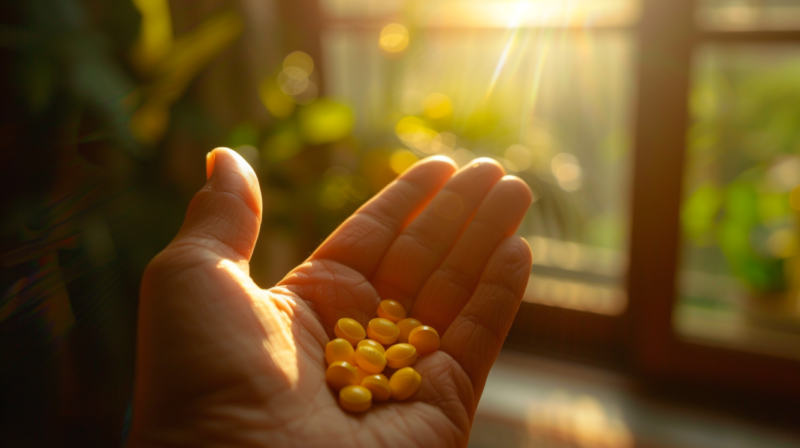
Water-Soluble Vitamins
Water-soluble vitamins include vitamins C and B vitamins. When consumed in excess, your body excretes these vitamins through urine, often resulting in noticeable color changes. For example, high doses of riboflavin (vitamin B2) can cause your urine to turn a bright yellow.
Vitamin B12 can also alter urine color, turning it a light orange or yellow-orange. This is common for individuals who take supplements. Additionally, vitamin C can make urine appear more yellow due to its excretion through urine.
Fat-Soluble Vitamins
Fat-soluble vitamins include vitamins A, D, E, and K. These vitamins are stored in the body’s fatty tissues and liver. Because they are not excreted as readily as water-soluble vitamins, their impact on urine color is usually less pronounced as per NCBI.
However, consuming large amounts of vitamin A supplements can sometimes result in urine appearing orange. Unlike water-soluble vitamins, fat-soluble vitamins do not typically cause bright, noticeable urine color changes unless taken in very high amounts.
Common Vitamins That Change Urine Color
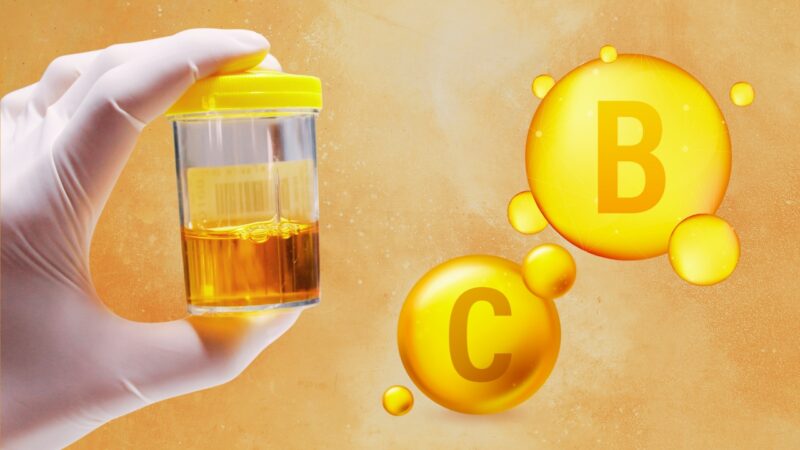
Vitamin B-Complex
Vitamin B2 (riboflavin) is known for turning urine a bright yellow or even neon yellow color. This is because riboflavin is water-soluble and any excess is eliminated via urine.
Vitamin B12 can also contribute to a similar color change. Like riboflavin, excess vitamin B12 is expelled in the urine, leading to a bright yellow hue.
Vitamin C
Vitamin C often causes urine to become a bright yellow or even orangish color due to its water-soluble nature. The body excretes excess vitamin C that it cannot use, which results in a noticeable change in urine color.
While it is generally safe to take vitamin C at night, be aware that this color change might still occur. If you consume high levels of vitamin C through supplements or dietary sources like citrus fruits, expect this color change.
Mechanisms Behind the Change in Color
Metabolic Processing
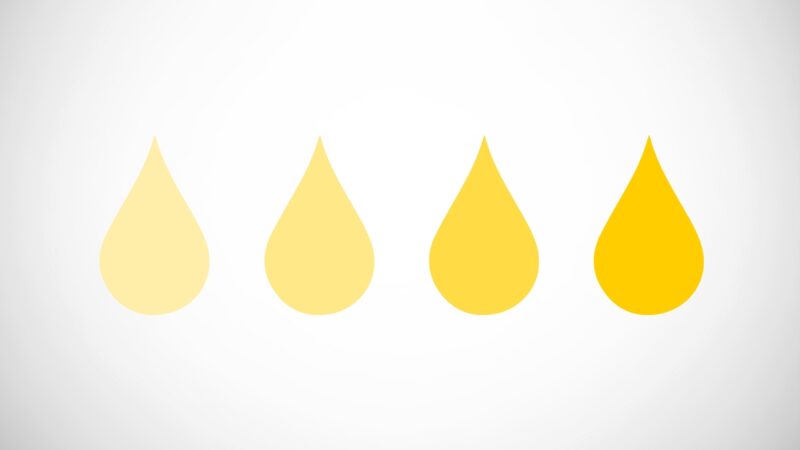
When you take vitamins, your body metabolizes them through a series of chemical reactions. For instance, vitamin B2 (riboflavin) is known for its fluorescent yellow pigment. Once metabolized, this pigment can clearly change your urine to a bright yellow or greenish hue according to the University of Rochester.
Your body breaks down some vitamins in the liver, affecting urine color. Certain conditions like Crohn’s disease or weight loss surgery can disrupt this process, influencing how your body handles vitamins such as B12.
Some medications and certain foods, such as beets or blackberries, contain pigments metabolized and excreted similarly, further affecting urine color. It’s crucial to understand that these metabolic processes are natural and generally harmless.
Excretion of Excess Vitamins
Your body excretes excess vitamins through urine, another key factor in color change. Water-soluble vitamins like vitamin C and B vitamins are not stored in the body. When consumed in high amounts, these vitamins are flushed out through your urine, leading to noticeable color changes.
For instance, high doses of vitamin B2, commonly found in multivitamins and supplements, can turn your urine a neon yellow. This happens because your kidneys filter out the excess, and it gets excreted. Certain foods like carrots or sweet potatoes, rich in carotene, can also cause your urine to look orange-tinted.
Fluids you consume also play a role. More water dilutes these pigments, resulting in paler urine, while less water intensifies the effect, creating more vivid colors. These color changes are typically harmless and indicate that your body is effectively processing and eliminating excess vitamins.
Guidelines for Vitamin Consumption
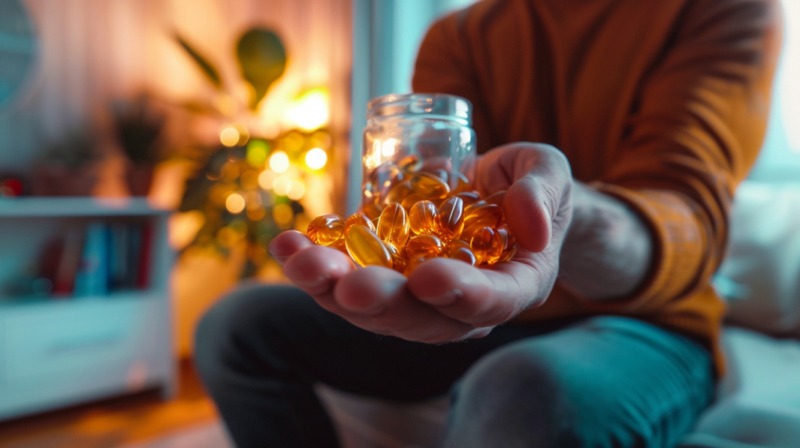
- Vitamin A: Adults need 700-900 micrograms (mcg) per day. It’s crucial for vision, immune function, and skin health.
- Vitamin C: Aim for 75-90 milligrams (mg) daily. This vitamin supports your immune system and helps with the repair of tissues.
- Vitamin D: A daily intake of 600-800 International Units (IU) is recommended. It is vital for bone health and calcium absorption.
- Vitamin E: 15 mg per day is sufficient. Vitamin E acts as an antioxidant, protecting cells from damage.
- Vitamin K: 90-120 mcg is the recommended daily amount. This vitamin is essential for blood clotting and bone health.

